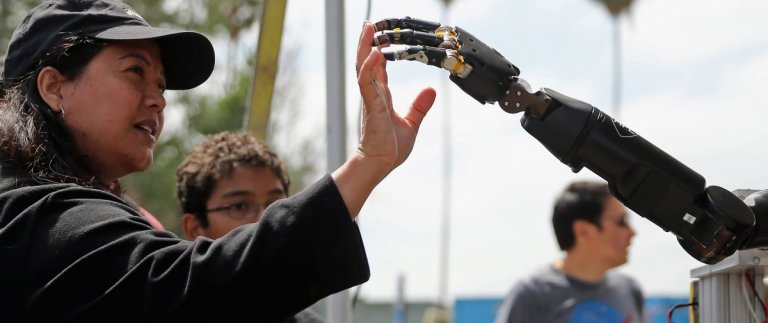
As technology continue to disrupt our lives, colleges and universities are evolving how they teach these subject too.
Few departments are as hot in demand as computer science departments, as the success of tech start-ups like Google and Uber fuel the constant flow of college students wanting to be the next Satya Nadella or Marissa Mayer. Computer science departments now offer specialised artificial intelligence degrees (Carnegie Mellon University) or receive enough investment to establish standalone AI laboratories (University of Rhode Island) or even a separate AI college (Massachusetts Institute of Technology).
But this change is not limited to computing departments. As science and technology usurps many areas of society, infringing privacy and displacing jobs, there are important questions left without answers. Questions such as who will regulate Big Tech? How do we respond to the ethical dilemmas technology like drones and machine soldiers pose? What are the apt punishments for a company like Facebook, which provided 87 million users’ personal information to Cambridge Analytica? Why did consumers not boycott Google for protecting executives who were accused of sexual misconduct?
There is a gaping hole for those who can comprehend the related social, political, economic, legal and ethical issues brought about by these advancements in science and technology. As Kathleen Vogel, Associate Professor of Political Science and Head of North Carolina State University’s (NC State University) Science, Technology and Society (STS) programme said:
“We need people who understand the tremendous technical problems and controversies that we face, but also that technical problems are never just technical. They have important social dimensions as well.”
The humanities alone may not be able to solve these issues. But these up-and-coming programmes, the ones which merge technology with the social sciences, might just be the qualifications needed to fill in this gap:
1. BA/BSc Science, Technology and Society – NC State University, US
In this interdisciplinary programme, students learn how to think and conduct research about science, technology and society, as well as to relate these matters to larger human concerns. Students can look forward to guest lectures like this year’s Calling Bull: Thinking critically about data in the social and natural sciences and placements in federal departments as public outreach specialists, policy analysts, training and development specialists and in other roles.
2. Double Degree in Criminology and Information Technology – Monash University, Australia

What if drones committed crime? Source: AFP/Manjunath Kiran
In this double degree, students juggle the study of crime and social control locally, nationally and globally, as well as learning the foundation of programming and computer systems. Across the four years, students gain “the technical expertise to shape and manage current and emerging technologies together with the lifelong communication, research and critical thinking skills that are acquired through study in the arts and humanities”.
3. Master’s Programme in Artificial Intelligence – Vrije Universiteit Amsterdam, The Netherlands
These robot pets are perfect companions for people with dementia pic.twitter.com/33EC3K1XsL
— NowThis (@nowthisnews) January 4, 2019
Focusing on hybrid intelligence, where AI systems and humans collaborate, this programme lets students take a technical or social science approach to understanding this synergy. The former will zero in on the understanding, analysis and development of novel AI algorithms, whereas the latter explores questions like “how can we develop and evaluate computer-based technology that exploits knowledge about human functioning?” and “how can human and AI-technology complement each other?”. Students graduate with a highly-diverse skillset in using AI techniques in social contexts, such as being able to optimise internet searches and supporting elderly people in their struggle with dementia.
4. MSc Economics and Management of Innovation and Technology – Bocconi University, Italy

Amazon can benefit from the know-how of someone with management and e-commerce expertise to solve its many labour issues, such as underpaid and overworked staff. Source: AFP/Johannes Eisele
At the world’s 10th-best business school, students can attend “a challenging interdisciplinary program that blends strategic, managerial, organisational and economic approaches in order to analyse innovation and technology both at firm and market levels (including the evaluation of legal implications).” This prepares them to take on future roles as industry analysts at large consultancies, business development managers at multinational companies, product managers at tech firms, analysts at regulatory authorities on innovation and intellectual development.
5. MPhil/PhD Science, Technology, Engineering and Public Policy – University College London, UK

Governments are facing pressure to regulate ride-hailing companies. Source: AFP/Drew Angerer
UCL’s Department of Science, Technology, Engineering and Public Policy (STEaPP) aims to train the next generation of interdisciplinary researchers at the interface of science and public policy. STEaPP’s research areas include development, digital technologies, innovation, research impact, science diplomacy, sustainability and urbanisation. Students will undertake six core training elements (modules from STEaPP), two specialisation training elements (modules from STEaPP or a sister department with UCL School of the Built Environment, Engineering and Mathematical and Physical Sciences BEAMS), a pilot project and a dissertation.
Liked this? Then you’ll love…
3 assistive technologies tailored to the needs of SEN students
These are the UK universities where you can get a degree in AR/VR







